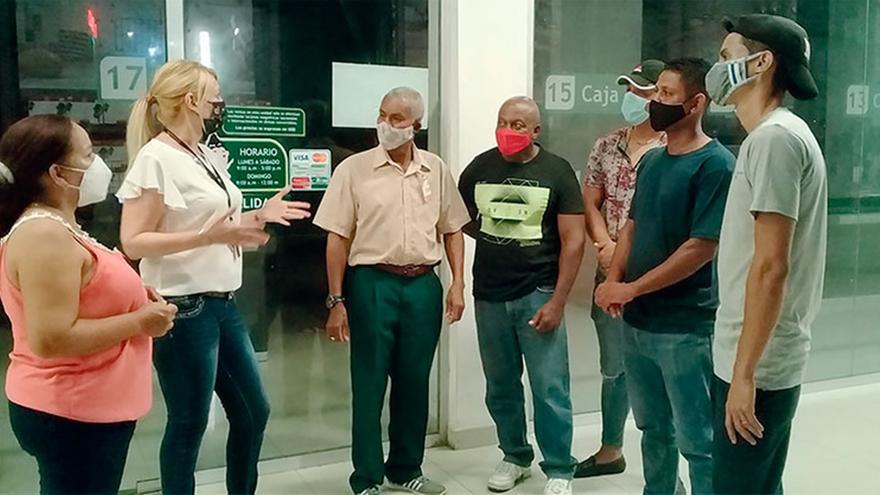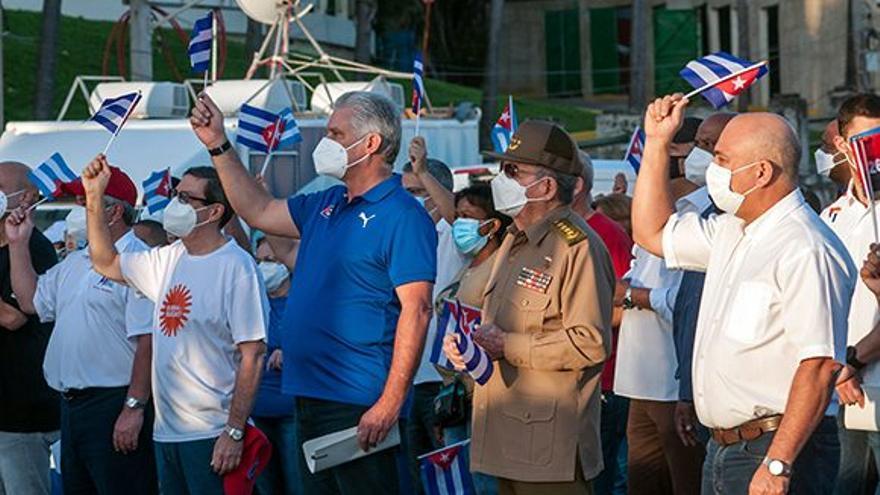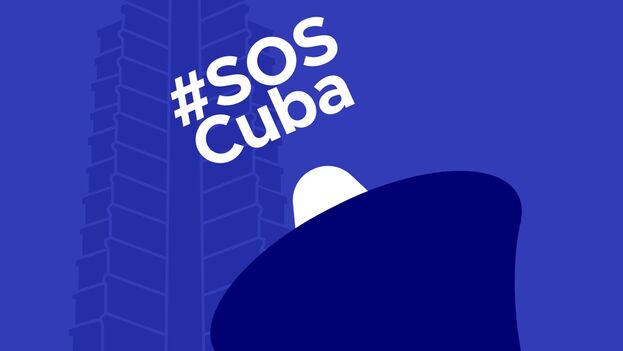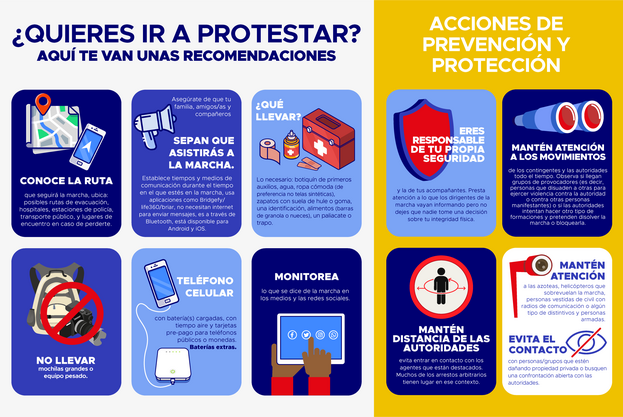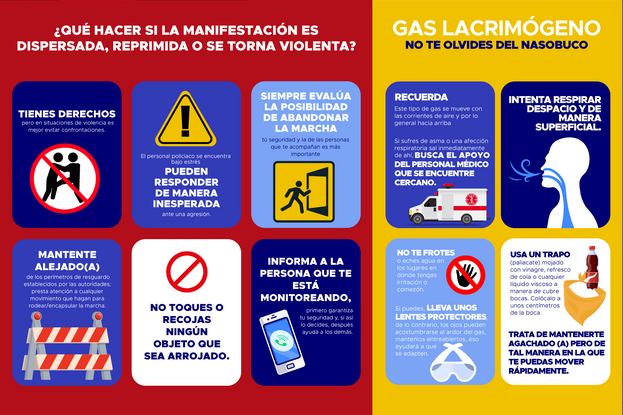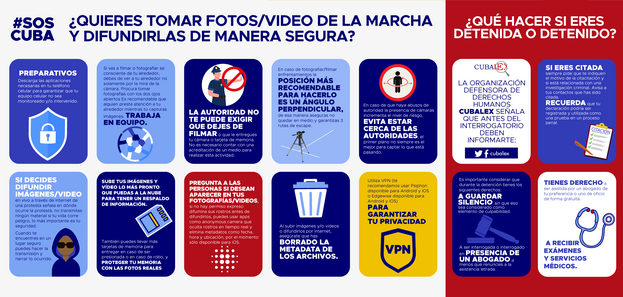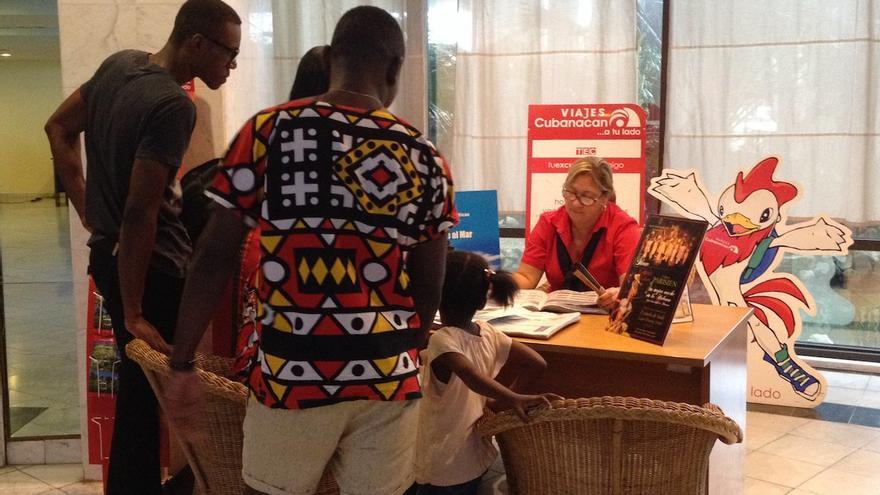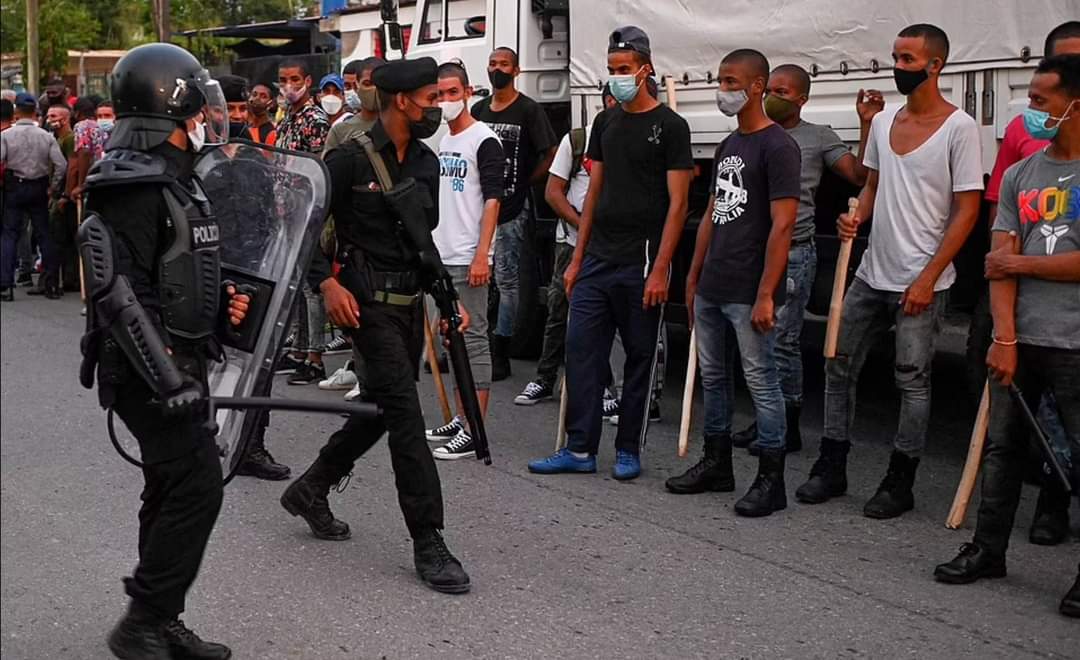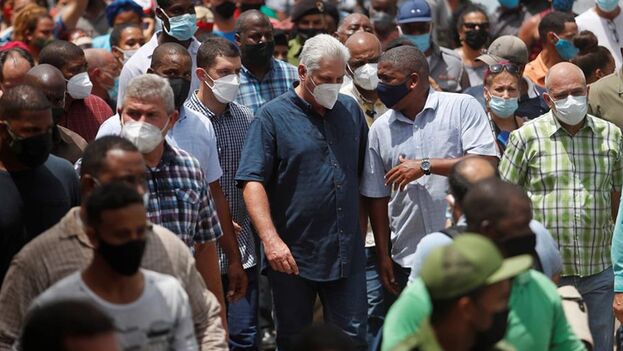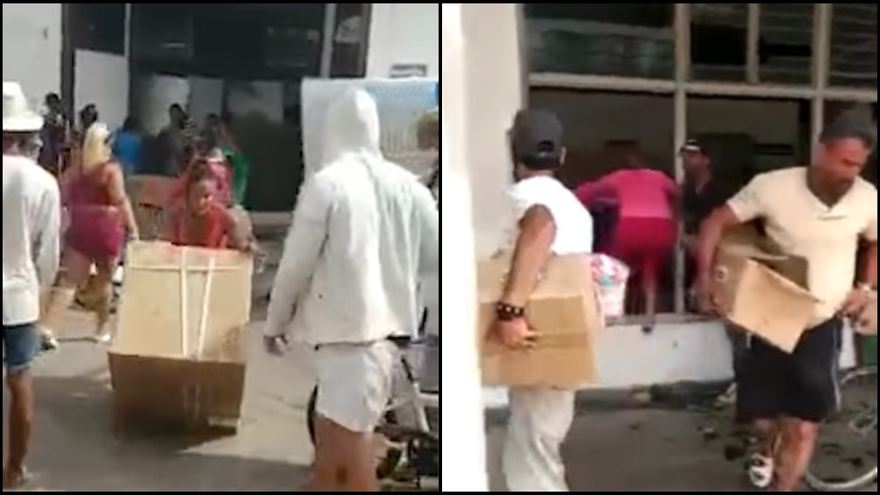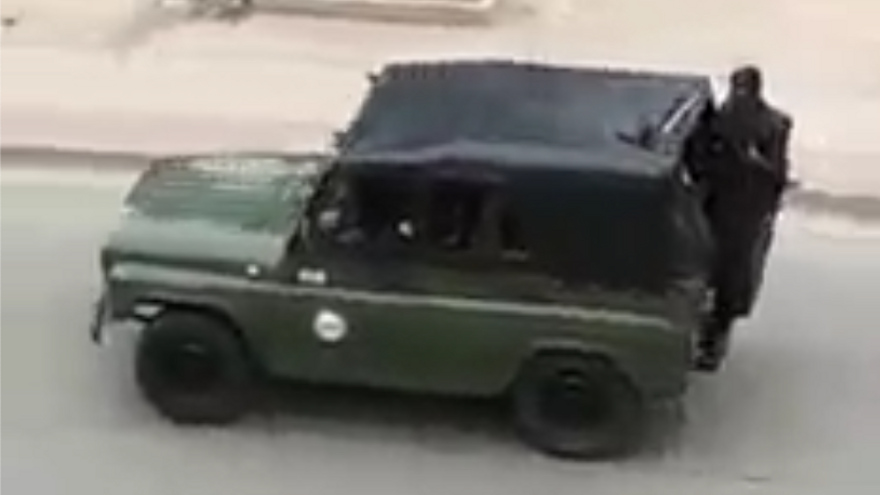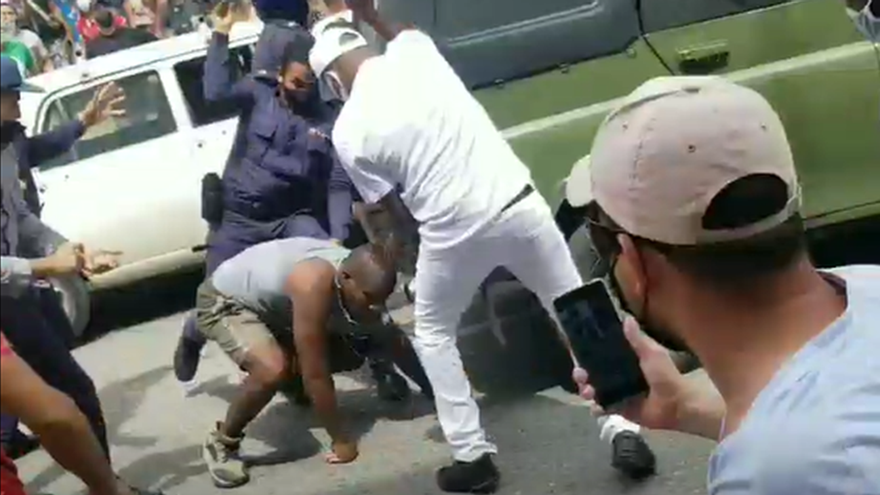The speeches alternated between calls for unity and a good dose of ideological intransigence. Díaz-Canel denounced the existence of an alleged “platform of media intoxication financed by the US Government and the political machinery of Florida, [with the aim] of encouraging unrest and instability in the country taking advantage of the difficult conditions caused by the pandemic, the intensified blockade, and the 243 measures of the Trump Administration.”
Raul Castro was also there, although he did not speak. Dressed in military uniform, he stood next to Diaz-Canel in the front row. The former leader had not appeared in public again since he handed over his position at the head of the Communist Party during the organization’s congress last April.
The official press estimated 100,000 attendees, although the cameras avoided taking the crowd from above and preferred continue reading
closed angles and closer views. “With the fulfillment of the hygienic-sanitary measures,” stressed the portal
Cubadebate, which also showed images of a similar demonstration in Pinar del Rio.
From the early morning, buses loaded with participants traveled the Havana avenues heading to the coastline. The demonstration took place in the area known as La Piragua, near Hotel Nacional and a few meters from the Anti-Imperialist Tribune, located in front of the U.S. Embassy.
The choice of venue has raised many questions. Some residents of the vicinity point out that the Tribune has been in remodeling works, and that it was not ready for the event, although other sources say that the square is already finished, and that the Government preferred not to use it to “avoid a view of little attendance, in case many people did not show up”.
The Tribune, a rectangular strip with arches that clearly measure the volume of attendees, has for years been the epicenter of political events in the Cuban capital, displacing even Plaza de la Revolución. Some consider that the change of locations on Saturday was a sign that “they do not want to poke the eye of the United States.”
The place was heavily guarded and with a wide deployment of agents of the State Security, as 14ymedio reporters were able to confirm. “There were many segurosos* and, in the call to participate, they warned how participants had to dress in order to detect anyone who wanted to break up the demonstration,” says one participant.”
“They brought two 82-millimeter anti-tank guns pulled by military jeeps to guard the act,” says analyst Julio Aleaga, a resident of the vicinity who saw the artifacts at the time the act was over, and they were being removed from the scene. The journalist also recognized the weaponry with ease as he spent his military service in a unit where they were handled.
The heavy protection was due, among other reasons, to the fact that several Internet users had alluded to the possibility that the demonstration would repeat the events of 21 December 1989 when a crowd began to boo, and forced Romanian dictator Nicolae Ceausescu, who had organized a public event to give a speech, to escape in a helicopter.
The demonstration in support of the Cuban ruling party on Saturday was called a few hours in advance, and provoked a bitter debate because it was made during the most alarming resurgence of the pandemic in Cuba. Numerous university students questioned the event they were called to attend, and received a furious response from officials and activists.
The students of the School of Biology were the first to publicly show their displeasure with the act, by posting on their Facebook account a text in which they expressed their “absolute dissatisfaction … Biologists, microbiologists and biochemists warn the authorities, and warn the university authorities of the risk posed by mass events at the moment.”
The publication, with few precedents in a university sector traditionally aligned with the Government, adds that “at a time of health crisis such as the one we face, it is best to stay at home, comply with hygienic measures, and follow the guidelines of the health authorities.”
The students added a call for “peaceful understanding, respect for individual freedoms and non-violence as a way” to solve problems. And finally, they expressed that “we are all Cubans, brothers from the same homeland, let our call be to unity as a principle to build a Cuba with all and for all.”
The controversy spread to other schools at the University of Havana such as Mathematics and Computing, where students were summoned to the event through instant messaging services. In the face of the epidemiological objections that many expressed, the dean of this center of higher education, Raul Guinovart Diaz, was adamant about the need to attend.
The academic, much quoted in the official media in recent months for his predictive models on Covid-19, responded to students who criticized the call to congregate on the Havana Malecon, near La Piragua, with a brief message. Guinovart’s text begins by saying “I understand all the concerns”.
“But when I compare the dangers of risking contracting covid” and attending the event “to defend the country and prove the unity of the people for the Revolution, I choose the second,” the dean said. “I have two backpacks ’one with bullets’ and one with ’medicine’. I can’t carry both. I pick the bullets,” he added, alluding to a phrase by Ernesto Guevara.
“Enemies use the virus as an ally to keep us out of action. If we stay home, they’re going to hit us. If we go to the march, it will delay the defeat of the virus, but the most dangerous enemy will receive a hard blow,” says Guinovart in the message that was answered with much criticism and new questions about his attachment to ideology to the detriment of science.
A similar call was also made in several provinces of the country for this Saturday, such as at the Marta Abreu de Las Villas Central University in Santa Clara. Several students reported to this newspaper the call they received via WhatsApp and Telegram. “I’m going to say that I couldn’t even read it because the instant messaging service here has been blocked since Monday,” one student said.
At the Institute of Higher Education of Havana, a professor also announced to the students that next Monday a meeting will take place with members of the Central Committee of the Communist Party to begin a process of recruiting students willing to face possible anti-government protesters. The call was initiated by the University Student Federation (FEU) and has been extended to all higher education centers in the country.
“It is dumbfounding, especially because it feels like déjà vu: in 1980 I was in the same Institute, and when the events of the Embassy of Peru and the exodus of Mariel happened, we were summoned to beat up and repudiate the students who would emigrate. At that time, I was expelled from the Communist Youth Union for refusing to take part,” says the mother of one of the young men who received the announcement.
“It’s only that now it’s worse, because the ’recruitment’ is done with members of the Central Committee directly,” the woman adds. “They have even been asked to report shifts and schedules they will have for that duty, and that they will receive a snack, which they will have to pay four pesos for.”
Translator note: Seguroso is a Cuban slang term to refer to Cuban intelligence officers dressed as civilians.
Translated by: Rita Ro
____________
COLLABORATE WITH OUR WORK: The 14ymedio team is committed to practicing serious journalism that reflects Cuba’s reality in all its depth. Thank you for joining us on this long journey. We invite you to continue supporting us by becoming a member of 14ymedio now. Together we can continue transforming journalism in Cuba.

![]() 14ymedio, Havana, July 19, 2021 — José Siro González Bacallao, bishop emeritus of Pinar del Río, died in that province at the age of 90.
14ymedio, Havana, July 19, 2021 — José Siro González Bacallao, bishop emeritus of Pinar del Río, died in that province at the age of 90.

